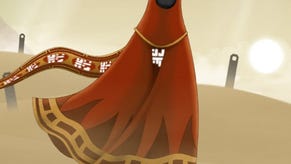Forward thinking: Sony's risk with unique ideas pays off
This generation, Sony gambled on new ideas. Its latest risk, Journey, shows the strategy has paid big dividends for both publisher and developer. Johnny Cullen explains.
I'm trying to think of any first-party or even a third-party publisher that would balance out what Sony has accomplished this generation in bringing new ideas to the table typically not seen elsewhere.
The truth, however, is I can't. This generation, it's published some of the best experiences not found on any other platform.
Not only that, Sony has also given more support to independent studios with its Indie Pub Fund which has been used to develop PSN-only games like Okabu, Papo & Yo, Payday: The Heist and others. The firm also provided PlayStation Vita development kits to indie studios as an act of faith, and support such as this has been non-existant on Wii and XBL - particularly XBLIG.
Sony's legacy in this department is exemplary leads with three glowing examples; one of which, out in two weeks, may just be its finest hour in this department.
Play, Create, Share
The first of these experiences Sony pushed for was LittleBigPlanet. Co-founded by a relatively unknown staff comprised of ex-Lionhead staff, Media Molecule's greenlight pitch for LBP had a pretty hefty champion in then-SCE WWS boss Phil Harrison, with its unveil at GDC 2007 arguably one of the finest seen this generation.
LittleBigPlanet also showed a more open online infrastructure with PSN compared to the likes of XBL and WiiWare at the time. As well as creating levels that let the player's imagination go wild, those levels would be shared throughout PSN to be played and rated by the community.
Since the release of LBP, more games have started appearing on XBL that feature the ethos of Play, Create, Share. One example is Trials HD, where you can create your own courses. Its sequel, Evolution, seems to be blowing the house down in comparison to HD. But before LBP and Trials, you'd be pretty hard pressed to find a game like them on Xbox Live.
Since LBP's introduction, it's now become one of Sony's biggest mainstay series: seeing a main sequel on PS3 last January, a PSP version and an upcoming Vita version, plus a karting-based spin-off. In March 2010, following the success of the original game, Sony announced it acquired Media Molecule, and the firm is now starting to move away from the series.
The Play, Create, Genre Sony championed in the past has also given us ModNation Racers on PS3, PSP and VIta.
How far for love?
If LittleBigPlanet was something for all audiences, Heavy Rain was a completely different situation altogether. Sackboy skins for the Quantic Dream thriller's four lead characters may have been released, but that was as flippant as the game would get.
If gamers harbored any apathy to mature stories in games, Heavy Rain dispelled such indifference at launch.
That aside, Heavy Rain showed Sony was open to new IPs, especially one with a mature story in an industry that isn't just for kids and teens anymore. At least, that was what QD creative head David Cage said at the 2008 Games Convention in Leipzig during Sony's press conference.
The main story centered around Ethan Mars, whose son had been kidnapped by a serial killer known as the Origami Killer. Three other playable characters in the game were also connected to the main plot in some form: FBI agent Norman Jaden, photographer Madison Paige and Scott Shelby.
It was an interactive story in the same vein as Quantic's prior effort, Fahrenheit, which based on choices the player made, affected how the ending played out.
If gamers harbored any apathy to mature stories in games, Heavy Rain dispelled such indifference at launch. For a start, six months after it released in February 2010, Cage announced at GDC Europe it had hit 1.5 million in sales and launched at number one on the UK charts. It was popular to the extent that there was a shortage.
There may be no sequel inbound, but Quantic Dream is content enough with its relationship with Sony, that the firm will publish its next project - an announce of which has been expected for the past year or so. The studio is even set to debut new tech that'll power the title at GDC next week.
Needless to say, Sony's big gamble with Heavy Rain paid off.
Don't stop believin'
Which brings us to Sony's latest effort in this area.
Thatgamecompany, one of the more well known studios which has stuck with PSN route, released its PS3 launch title flOw in 2007 before releasing the incredible Flower in 2009 - my personal pick as downloadable game of the year.
Journey, however, is a completely different ball game. While flOw was about aquatic gameplay and Flower was about having a flower-based experience whilst revitalising the world around it, Journey is more of a pilgrimage. I'd give a theory on what said pilgrimage is, but I'd be ruining what is otherwise an amazing, classy experience that needs to be played to be seen.
What Journey is, however, is beautiful. It's obvious, but it still needs stating: it's gorgeous. From start to finish, its art design fits ridiculously well, and the latter parts - which were not shown in the multiplayer beta from last year - are utterly breathtaking. This may seen vague now, but when you play it, it'll click.
Online also makes sense. Journey comes with a co-op component where you team up with an unknown on PSN throughout the game. You won't know the username of that person - or any other people you've teamed up with, for that matter -until the end credits have rolled.
Continuing with the non-traditional online support, there's no voice support, The only form of communication is the mere press of the circle button, which makes brilliant sense. Minimalist contact, but you'll easily read signals like a call for help, and know to wait until you've caught up, or to go on ahead.
In short: I love Journey. A lot. It is, bar none, my game of the year, even though we've just entered March. What thatgamecompany's created is nothing short of incredible. While flOw and Flower only scratched the surface, Journey finds the studio Jenova Chen and Kellie Santiago founded in 2006 breaking through as one of the best independent studios today, and one of the best in its class.
Chen has since told Push Square in an interview it's looking at "a bigger audience" for its next project now its three-game deal with Sony has ended.
Yet, the undying support Sony's shown for Journey and thatgamecompany, new IPs like Heavy Rain and independent studios, proves that such risk-taking for mature, new IP is needed in our industry - and it pays off with enough work.
Sony's continuing journey will see thatgamecompany get off at the next stop to go elsewhere, but the road ahead is looking rather golden. Let's hope it stays that way.
Journey launches on March 13 in the US and March 14 in Europe for $14.99.









